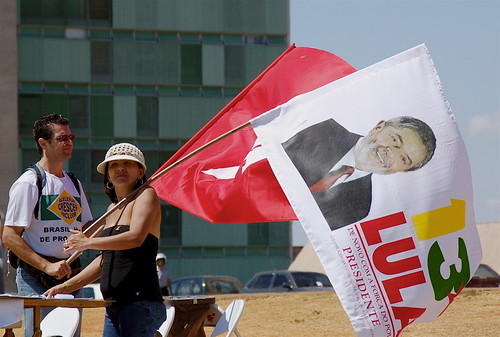PT
Workers Party of Brazil: The different strategies of the Latin American left

By Valter Pomar, secretary of international relations, Workers’ Party (PT) of Brazil
October 10, 2009 -- It has become commonplace to say that there are two lefts in Latin America: one would be “carnivore”, the other “vegetarian”; one would be radical, the other moderate; one would be revolutionary, the other reformist; one would be socialist, the other capitalist.
Dichotomous definitions of this kind are made by spokespersons (official or unofficial) of the US State Department, with the explicit purpose of bringing about discord in the Latin American left, making it fight itself rather than its common enemies.
Caracas to host world meeting of left parties, October 7-9, 2009
By Federico Fuentes, Caracas
Characteristics of the experiences underway in Venezuela, Ecuador and Bolivia
June 27, 2008 -- In Latin America, if we exclude Cuba, we can point to three general categories of governments. First, the governments of the right, the allies of Washington, that play an active role in the region and occupy a strategic position: these are the governments of Álvaro Uribe in Colombia, Alan García in Peru and Felipe Calderón in México.
Second, we find supposed “left” governments that implement a neoliberal policy and support the national or regional bourgeoisies in their projects: Brazil, Uruguay, Chile, Nicaragua and the government of Cristina Fernandez Kirchner, from Argentina’s Peronists. They are governments that implement a neoliberal policy that favour grand capital, covered up with some social assistance measures. In effect, they make it a bit easier to swallow the neoliberal pill by applying social programs. For example, in Brazil poor families receive a bit of help from the government, which assures them popular support in the poorest region of the country.
XIV Sao Paulo Forum: Left parties debate the current historic conjuncture
By Inés Hayes, with reports from Montevideo by Cristina Camusso and Julio Louis.
The Brazilian Workers Party and the participatory budget in Rio Grande do Sul
By Ben Reid
CONTENTS
Links 23: Editor's introduction
Challenges in uniting the left
Previous issues of Links have frequently discussed internationalism and internationals, or the question of how socialists should collaborate on an international scale. This issue is devoted to the closely related matter of left regroupment, or how socialists can collaborate at the national level. It discusses the challenges of left regroupment through concrete experiences in Australia, England, Scotland, France and Brazil.
In Australia in 2002, the Socialist Alliance, grouping nearly all the far-left organisations, was able to overcome difficult electoral registration requirements in several states and attract as new members a significant number of activists who were not members of any of the component groups. In September, the Democratic Socialist Party (DSP), the largest member organisation of the Alliance, proposed to spur the process of left regroupment by becoming an internal tendency within the Alliance and carrying out all its public political activity through the Socialist Alliance.
By Sundaram
A version of this article originally appeared in the March issue of Liberation, the central organ of the Communist Party of India (Marxist-Leninist). The author is an independent journalist and film-maker.
After they popularised the slogan "Another world is possible", it was inevitable that one day some wit would taunt the organisers of the World Social Forum with a parody of the original: "Another forum is possible?"
But mid-way, as we are, between the third WSF (concluded earlier this year in Porto Alegre, Brazil) and the fourth WSF (scheduled for January 2004 in Mumbai, India) this half-mocking, half-humorous quip is taking on more serious tones. Is indeed another WSF possible?